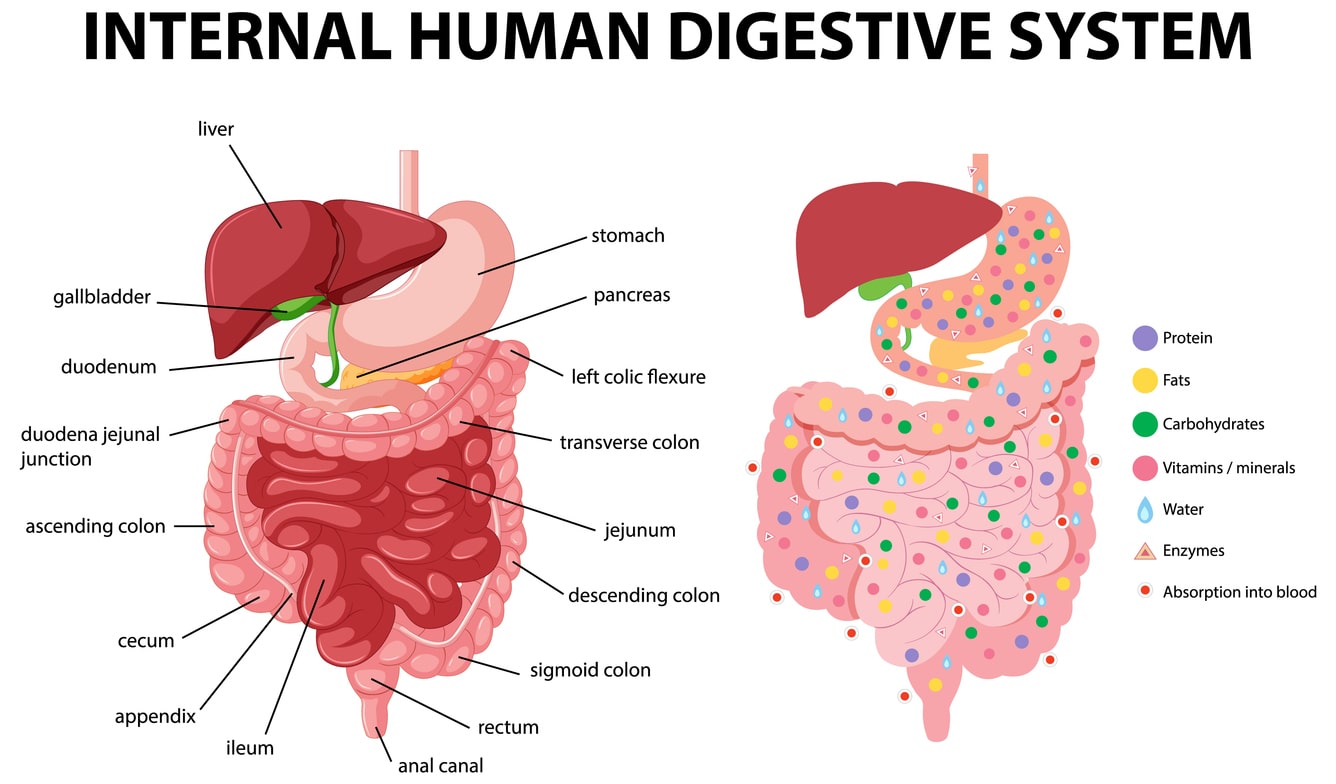
How Long Does It Take to Digest Food?
Digesting food is a complex process. It requires teamwork from different organs and systems in your body. From the moment you take a bite of food, it enters a long journey through your digestive system that lasts several hours. S0, how long does it really take for food to be fully digested?
Your Digestive System Order
Once you eat, your body begins breaking food into usable nutrients through a series of well-coordinated steps:
- Mouth: Digestion starts with chewing. Saliva contains enzymes that begin breaking down carbohydrates, making food easier to swallow and process.
- Esophagus: Food travels to your stomach through the esophagus in just a few seconds, moved along by wave-like muscle contractions called peristalsis.
- Stomach: In the stomach, gastric juices like hydrochloric acid and enzymes break down proteins and fats. This step turns food into a semi-liquid mixture called chyme, which allows it to move more easily through the digestive tract, typically in 1 to 2 hours.
- Small Intestine: Most nutrient absorption happens in the small intestine, where villi (tiny, hair-like structures) draw nutrients into the bloodstream. This process lasts 3 to 6 hours, with simple carbs digesting faster than proteins and fats.
- Large Intestine (Colon): Undigested material moves to the large intestine, where water is absorbed, and waste is formed into stool. This stage can take anywhere from 12 to 48 hours, depending on factors like hydration and gut health.
- Elimination: Finally, waste exits the body through the rectum and anus, completing a process that varies but typically takes 12 to 48 hours after eating.

Factors That Affect Digestion Time
Digestion time can vary due to several factors. Here are some key influences for digestion time:
- Type of Food: Carbohydrates digest quickly (1-2 hours), while proteins and fats require 3-6 hours to break down.
- Meal Size: Larger meals take longer to digest due to the increased effort needed for the digestive system.
- Hydration: Staying properly hydrated helps your digestive system work efficiently, while dehydration can slow down the process.
- Age: As you age, your metabolism and digestive efficiency may slow, leading to longer digestion times.
- Physical Activity: Regular exercise stimulates the digestive system, promoting faster digestion and reducing bloating or sluggishness.
Average Digestion Time for Different Foods
While individual digestion times can vary, here are some general guidelines for how long it takes to digest certain types of food:
- Fruits and Vegetables: These foods are rich in fiber and water, which aids digestion. They are usually digested quickly, within 1 to 2 hours. Some fruits, such as melons and berries, are especially fast to digest.
- Whole Grains: Whole grains like oats, quinoa, and brown rice contain fiber and complex carbohydrates, making them take a bit longer to digest. They typically take around 3 to 4 hours to move through the stomach and small intestine.
- Lean Proteins: Foods like chicken, turkey, and fish are easier to digest compared to fatty meats. They usually take 3 to 4 hours for digestion.
- Red Meat and Fatty Foods: Beef, pork, and fatty cuts of meat can take up to 6 hours to digest, as they require more stomach acid and digestive enzymes to break down.
- Dairy Products: Dairy can be difficult to digest for some people, especially those with lactose intolerance. Generally, dairy takes around 3 to 4 hours to digest, though this can vary depending on the individual.
- Processed Foods: Highly processed foods, such as fast food and packaged snacks, tend to be digested more slowly because they often contain unhealthy fats, added sugars, and preservatives. These foods can linger in the stomach and intestines for several hours.

How to Improve Digestion
Improving digestion starts with simple habits that help your body work better. Eating smaller, more frequent meals throughout the day can prevent overloading your digestive system and make it more efficient. Staying hydrated is also important—try to drink 8 to 10 cups of water each day, or more if you’re active, to keep everything running smoothly. Choosing whole, healthy foods like fruits, vegetables, lean proteins, and whole grains instead of processed foods gives your body the nutrients it needs and is easier to digest. Regular exercise can help food move through your system faster, while managing stress with activities like deep breathing, yoga, or meditation can prevent stress from causing digestion problems. Making these small changes can lead to a healthier digestive system.
The Role of Fiber in Digestion
Fiber is essential for good digestion. Found in fruits, vegetables, whole grains, and legumes, it comes in two types: soluble and insoluble. Soluble fiber dissolves in water, forming a gel-like substance that slows digestion, helps control blood sugar, and lowers cholesterol. Insoluble fiber adds bulk to stool, helping food move through your digestive system and preventing constipation.
Eating enough fiber can reduce bloating, gas, and irregular bowel movements. The recommended daily fiber intake for most adults is 25 to 30 grams of fiber daily, and drinking plenty of water is important to help fiber work effectively. Adding more fiber to your diet is simple. Try including leafy greens, whole-grain bread, or a handful of nuts in your meals. These small changes can improve your digestion time.

Contact Us for Care
The time it takes to digest food varies depending on the type of food, meal size, hydration levels, and individual health conditions. While digestion itself may take anywhere from 4 to 6 hours, it may take up to 48 hours for the entire digestive process to be completed. By understanding digestion times and adopting healthy habits, you can support your digestive health and improve your overall well-being.
If you have lasting digestive discomfort, consult with our team. At GastroMD, our specialists are here to help you manage and improve your digestive health. Contact us today for expert care and guidance tailored to your needs.



